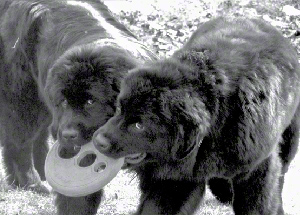by Tracy Warncke
Sanitation means more than just scooping the poop. It also extends to feeding utensils, crates, dog food and your yard. The cleaner you keep your dog and his "belongings" the healthier he will be.
You should wash your dog's food bowl after each meal - yes, just like you wash your own dishes. Little bits of leftover food can spoil. It will also attract flies. Make sure your remove the bowl immediately after feeding time. During the hot summer months food can spoil quickly. The longest lasting and easiest to clean bowl are made stainless steel. Hot soapy water renders a stainless steel bowl clean and shiny! Make sure you rinse well to remove all soap residue. Easier still, buy extras and run them through your dishwasher.
Stainless steel buckets are terrific as they are indestructible (they can't be chewed and the handles don't break off) and easy to clean. They also last forever because they don't rust. In the northern climates where the temperature drops below freezing you don't have to worry about the buckets splitting from the ice. If you have two or three dogs in a run stainless steel buckets might not be quite big enough. You might want to try "horse buckets". These are large, heavy plastic buckets that can take a great deal of abuse. As with your food bowls, your water buckets require a daily washing with hot soapy water. Whether you use stainless or plastic, during the heat of summer an occasional scrubbing with a bleach and water mixture will help keep down the algae that can grow overnight. If your dog is outside a great deal change that bucket twice a day. Don't just add water to fill it up, dump out the old and refill completely (the water you are dumping out is great for watering plants during those dry summer months when the water restrictions are on). This ensures that your dog has fresh, clean, cool water all day and will help minimize the mud on the bottom! Rinse, rinse rinse after any washing and remember to keep those buckets in the shade when it's hot.
Food storage can create problems as well. Try putting your dog food in a garbage can. A 33 gallon (fairly small outdoor metal or plastic can) trash can will easily hold a 40 pound bag of dog food. These containers will prevent mice from getting into the dog food. A tight fitting lid, with bunjee cords will prevent those giant 120 pound, giant black mice from helping themselves to a snack! Keep your dog biscuits in a container with a tight fitting lid as well. This helps to keep them fresh and minimizes any infestation of grain moths. Try to store your dog food and biscuits in a cool dry spot. If this isn't possible purchasing smaller bags more frequently during the hot, humid summer months will help to prevent spoilage as most stores are air conditioned!
Examine your yard for any sources of standing water. Mosquitoes only need a very small amount of standing water in which to lay their eggs. Empty all buckets, tires, garbage cans and kiddie pools of any water when they are not in use. Eliminating the breeding ground will help you reduce the use of chemicals which may be toxic to your dog.
You are aware that most dogs (skunks and raccoons also) find garbage just about irresistible. While there is no simple solution, there are several steps you can take to make it more difficult for your garbage cans to become the victim of a midnight raid. It's more likely you will hear the racket and be able to stop the intruder before your garbage is spread across the neighborhood. Purchase garbage cans with handles that "lock" the lids on. Tight bunjee cords through the handles will help. If possible place your garbage cans in a shed, garage or bin and keep the doors closed.
Finally, a word about your dog's crate. Remember, this is his/her home and it should be kept clean. Wash the pan (the solid metal liner on the bottom) on a weekly basis. Again, bleach and water will kill any bacteria. If you are using any kind of mat (old towels, blankets, rug scraps) wash these on a weekly basis as well. During flea and tick season you might want to wash these daily to kill any eggs that might be deposited. Daily washing is especially important if you dog is ill.

